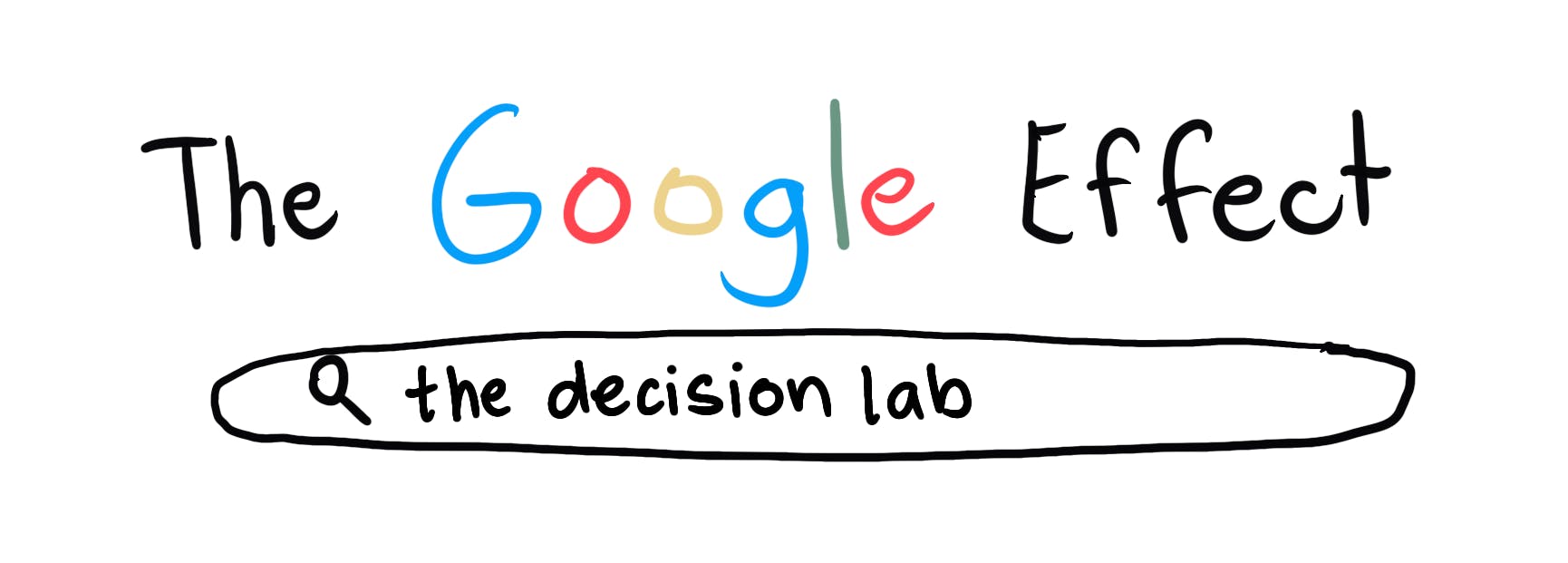Why do we forget information that we just looked up?
Google Effect
, explained.What is the Google Effect?
The Google effect, also known as digital amnesia, is the tendency to forget information that is readily available through search engines like Google. We do not commit this information to our memory because we know that this information is easy to access online.

Where this bias occurs
Suppose that you’re reading a book and encounter an unfamiliar word. You decide to Google the word to find out its definition. A few days later, you encounter the word again… but you can’t seem to remember what it means.
This situation describes the Google effect; when information is readily available online, we do not commit it to memory. Google has become such an integral part of our daily lives that it was added as a verb to the Oxford English Dictionary in 2006.1 It is so easy to “Google it,” that we may find ourselves repeatedly looking up the same information online instead of committing it to memory.
This bias exists not only for things we look up on search engines, but for most information that is easily accessible on our computers or phones. Do you know your parents’ or best friend’s number by heart? The answer is probably no—thanks to the Google effect.
Debias Your Organization
Most of us work & live in environments that aren’t optimized for solid decision-making. We work with organizations of all kinds to identify sources of cognitive bias & develop tailored solutions.
Related Biases
Individual effects

The Google effect impacts the ways we learn, problem-solve, and recall information. While the Internet has opened up a new realm of possibilities for what information we can obtain, our engagement with the world can become shallow when that information isn’t being ingrained as lasting knowledge.
Although some people believe the Google effect is a sign of being technologically savvy, there is no evidence that we are getting any better at researching information.2 However, there is growing evidence that we do not evaluate facts we encounter online,2 which can be dangerous because the Internet is plagued with misinformation.
Alternatively, the Google effect demonstrates our impressive proficiency when it comes to prioritizing information. We have learned to use the Internet as our own personal repository for knowledge, splitting the burden of encoding and storing. In other words, although we effortfully process new information, we depend on Google to retain that information. This tradeoff is known as transactive memory.3
We may no longer waste effort remembering something that can easily be looked up online. However, if the quality of that information is poor, the Internet is actually doing little to improve our intelligence and productivity.
Systemic effects
The Google effect suggests that the digital world is changing the way that we think. We are less likely to digest or deeply encode information, knowing that we can always “Google it.”
There has been a great deal of research that suggests increasing dependence on the digital world has negative consequences. This includes decreased attention spans, increased anxiety, lower performance on cognitive tasks, and diminishing social skills.4
The Google effect may be new in its digital form, but our tendency to not remember information that we know we can access elsewhere is not a novel phenomenon. The Google effect is a form of transactive memory, where team or work environments encourage us to develop a group memory.3 Since information gets divided up into different people’s individual memories, team members are only required to remember their piece of the puzzle.
The Google effect can therefore be thought of as an effective way to not overload our brains with information. However, reliance on a computer can have different effects than dependency on our work team, especially when spontaneous retrieval is necessary. If your boss asks for the latest numbers on an ongoing project, it is much more socially acceptable for your colleague to chime in, rather than you pulling out your phone to look it up.
How it affects product
Thanks to social media, many of our daily interactions are no longer face-to-face but screen-to-screen. Online profiles provide us with instant access to an endless bank of information about almost anyone. This means that even if we have a conversation with someone in person, we may neglect retaining as much information about them, knowing we can easily find it later. This can be as simple as not being able to get a grasp on your classmate’s name, constantly having to check Instagram to remember. Or this might mean quickly forgetting your new coworker’s educational background and previous company, since you know you’ll add them on LinkedIn later.
Although online presences can act as a great secondary source, they should not be the primary way we form our impressions. After all, it feels pretty insulting when we can’t remember anything about one another—or even worse, remember incorrect information, since the Internet is full of lies, intentional or otherwise. With this in mind, try out interacting with others as if they don’t exist virtually. This way, you might find it a bit easier to remember their name.
The Google effect and AI
You’ve heard of the Google effect, but what about the ChatGPT effect? As it turns out, our digital dependency extends from search engines to machine learning, where we rely on automated responses to store information rather than our own minds. In fact, language models may exaggerate this effect – it’s no longer other writing we forget, but our own.
While we easily encode our own work, we just as easily forget work by others. This becomes an issue when we take credit for words written by robots. This is not to say we shouldn’t use machine learning to bypass short tasks—just make sure you actually read and remember ChatGPT’s response before sending it out into the world.
Why it happens
Our brains encounter lots of new information on a daily basis. It is difficult for us to commit all this information to memory, and therefore, we might have to prioritize what information we choose to remember.
Even though the Google effect is about forgetting information, anthropologist Dr. Genevieve Bell suggests that it actually could be a sign of efficiency.5 After all, knowing how and where to access the information is often more important than knowing the small pieces of information themselves.
Why it is important
Although the Google effect is an efficient way to prioritize what information we commit to memory, it unfortunately leads us to become overly reliant on the digital world.
The Google effect causes us to treat the Internet as a permanent memory bank, believing that we will always have access to it. This might be helpful for general information or facts, but not so useful when it comes to learning and storing personal information.
Imagine that a young woman named Christina is out at a bar one night and loses her phone. She starts walking home but realizes she doesn’t know how to get there—after all, she always uses Google Maps. She wishes she could call a taxi or her parents to come pick her up because it’s dangerous to walk home alone at night. Christina sees a payphone, but she doesn’t know any taxi companies’ numbers, let alone her parents’, since she always looks them up. Christina has found herself in an uncomfortable situation that she can’t get out of because she has become too reliant on digital devices.
These types of situations where we can’t access online information are the ones we never expect to be in. With this in mind, it is essential to learn how to make information that matters readily accessible—not on our phones, but in our minds.
How to avoid it
In our digital age, we cannot completely avoid the Google effect; no matter what, our work or school responsibilities will require us to search for information online. However, by being aware of this bias, we can remind ourselves that there are better ways to expand our knowledge beyond search engines.
The first thing we can do is look to other sources to gather information. Try checking a book out from the library or printing out a document instead of reading it on a screen. Taking hand-written notes instead of just skimming also helps us actively store facts in our long-term memory.
Second, if we know we looked something up online and can’t remember what it was, we should resist turning straight to the Internet for help. Instead, we can pause and take a moment to activate our memory for the answer. Try recalling contextual clues, like where you were when you first searched it, or even why. If this still doesn’t jog your memory, give Google another chance—this time intentionally encoding the information to avoid any future digital dependency.
How it all started
The Google effect was first studied in 2011 by influential psychologists Betsy Sparrow, Jenny Liu, and Daniel Wegner.3 With search engines like Google becoming the most obvious place to turn to for answers, Sparrow and her team wanted to see whether people had begun to treat the Internet as external memory storage.
The psychologists conducted four experiments examining the Google effect.
In the first experiment, participants answered yes/no trivia questions and then completed a modified version of the Stroop task, which involved identifying the text color of words. The researchers compared how long it took participants to identify the color of computer terms like “Google” to how long it took them to identify the color of non-computer terms like “Nike.” They found that it took participants longer to name computer terms after hard trivia questions. These results reveal that we are primed to think about computer terms when asked difficult questions, distracting us from being able to identify the color since our attention has been captured by the term.
In the second experiment, participants were split into two different groups. Every participant had to read and type out 40 general trivia questions. One group believed the computer would save the information, and the other thought it would be erased afterward. The researchers found that those who thought the information would be erased had the best recall for the trivia statements that they had typed out, demonstrating that we are less likely to commit information to memory that we think we can access later.
In the third experiment, participants once again had to read and type out trivia statements. For one-third of the questions participants saw the message “Your entry has been saved,” for another third they saw “Your entry has been saved into folder X,” and for the last third they saw the message “Your entry has been erased.” Afterward, participants completed a recognition task, where they were shown 30 statements and had to decide if these statements matched the ones they had already encountered.
To no surprise, participants had the best memory for the statements they thought had been erased. Participants were also asked whether the statement had been saved, and if so, where it had been saved. In this instance, participants better recalled which statements were saved than which were erased, suggesting that when we believe we will be able to access the information later, we remember how to access it rather than the information itself.
In the final experiment, participants were told that all the trivia statements they read would be saved to a specific folder. Participants then had to write down all the trivia statements that they remembered, followed by having to determine where the information had been saved. Participants had better recall for which folder the trivia statement had been saved to than memory for the actual trivia statements themselves.
Example 1 – Altering experiences
A study conducted by Linda Henkel, a psychologist specializing in memory, examined whether the Google effect extended to photographs.6 Remember that photographs are a form of external memory we often store on our smartphones.
In Henkel’s study, participants went on a guided tour of an art museum and were given instructions to observe some objects and take photographs of other objects. Participants learned they would later be asked to recall the names of the objects and what the objects looked like. The next day, participants were asked to write down all the names of the objects that they had looked at, and a subsequent task asked them to recall details about them.
Henkel found that participants were significantly worse at remembering the names and details of objects that they had photographed compared to those that they had observed.
This study suggests that we take in less of what we experience through photographs than what we experience through observation. With the rise in popularity of social media, people often take photographs daily. Henkel’s study suggests that we are less likely to remember events that we photograph, so living life through a lens might decrease the quality of our experiences because we aren’t truly absorbing them.5
Example 2 – Cybersecurity
The Kaspersky Lab, a company dedicated to formulating innovative cybersecurity solutions, has taken great interest into how the Google effect poses risks to our safety and productivity online. They have conducted a number of surveys to learn how people treat the information they acquire and store digitally.
One downside to the Google effect in the work environment is that people overestimate their ability to listen and type simultaneously. 44% of business professionals that the Kaspersky Lab surveyed claimed that typing notes caused them to miss valuable information such as contextual or emotional clues. Moreover, since we aren’t listening as well when typing, our typed records become the only place that information is retained. 13% of those surveyed admitted that they have lost a digital record and as a result are unable to remember anything about a particular conversation.7
The Google effect can also lead to safety risks when companies’ information is stored on digital technology. Another survey by the Kaspersky Lab showed that 58% of people surveyed do not use antivirus software, and only 29% of people back up their digital devices.8 This means that companies’ confidential information can easily be hacked, and someone’s hard work can go to waste if their computer crashes.
Summary
What it is
The Google effect is our tendency to forget information that we can easily access online or on our digital devices. This includes general knowledge that we acquire through search engines as well as notes, contact numbers, or photographs saved on our computers and smartphones.
Why it happens
The Google effect occurs because our brains don’t prioritize remembering information that we will be able to access later. Although it can be a sign of being more effective with what needs to be remembered, it creates a dependency on technology that can have negative consequences on our intelligence.
Example 1 - Altered experiences
Photographs act like an external memory storage in a similar way that the Internet does. While photographs may help us remember something if you look at it, taking a photograph instead of just observing what is around us makes us less likely to be able to remember it without the help of our devices.
Example 2 - Cybersecurity
The Google effect means that employees are reliant on their digital devices to remember and store information. Employees are likely to use their devices to type out notes, which causes them to remember less of the conversation than if they had just focused on listening. Since devices become the only storage for important information, if computers crash, all that information is lost. Additionally, our dependency on technology means that a company’s confidential information might be stored online, leaving them at greater risk of having that information stolen or hacked.
How to avoid it
The easiest way to avoid the Google effect is to look to other sources to gather information. However, this usually requires more effort and time. Alternatively, we can try to take hand-written notes or take a few moments before looking something up to see if we can activate our brains to remember it first.
Related resources
Algorithms for Simpler Decision-Making: The Case for Cognitive Prosthetics
In this article, Jason Burton, one of our writers with a strong background in Cognition and Computation, discusses our tendency to look to digital spaces for information that helps us make decisions. Burton questions how algorithms determine what kind of information we see and reflects on the human-algorithm relationship that we have come to rely on.

